Campo’s Classics: The Brisbane Broncos golden era that never came
In this week’s edition of Campo’s Classics we take a look at a hotshot Broncos side that had the entire rugby league world at their feet.
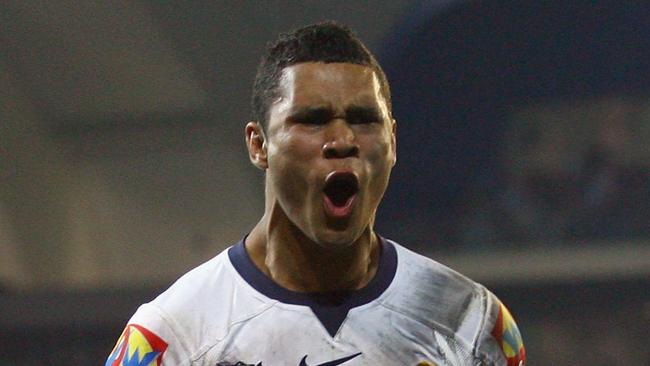
NRL
Don't miss out on the headlines from NRL. Followed categories will be added to My News.
Who’s top of the locks? Bunnies great league’s best No.13
- NRL under pressure to shed massive salaries of top brass
The footy is gone, we don’t know when it’ll come back and that absolutely sucks (but it might be close).
But until it comes back, we can always think back to great games from the past.
Every week until the NRL comes back, we’ll dive into a classic game from the archives and dissect how it was won and lost, and what it meant.
Campo’s Corner might be on ice for a while — welcome to Campo’s Classics.
This week the Broncos were supposed to face the Sharks, so let’s wind it back to 2010 to when the two sides clashed at Suncorp Stadium.
Things work differently for Brisbane than they do for everybody else.
There’s no escaping that, no getting around it, and pretending the Broncos are like any other club is just that — pretending.
It’s not right to say the Broncos demand success — they simply expect it. They expect to be there when the premierships are decided because they are the Broncos, and the idea of a competition being decided without their being involved is a totally foreign concept.
That’s what happens when a team wins six premierships in their first 18 seasons. That’s what happens when they make the finals 26 times in 30 years. That’s what happens when the line of quality players to come through the club, and the resources to find and retain those players, is endless.
There’s no other club like that. It makes things different, because expectations are heightened and the stakes become higher than you can imagine. Win six premierships at any other club and they’d carve your face on a mountain. Wayne Bennett won six premierships with the Broncos and they still got rid of him, twice. That’s what we’re dealing with here.
The most lasting impact of Bennett’s first reign, apart from the on-field success, was the off-field network of development he and others helped to build. On the back of scouts like the legendary Cyril Connell, Brisbane dug up talents other clubs missed, and broke the bank for the talents other clubs wanted.
Relive classic NRL matches from the 60s to today on KAYO SPORTS. New to Kayo? Get your 14-day free trial & start streaming instantly >
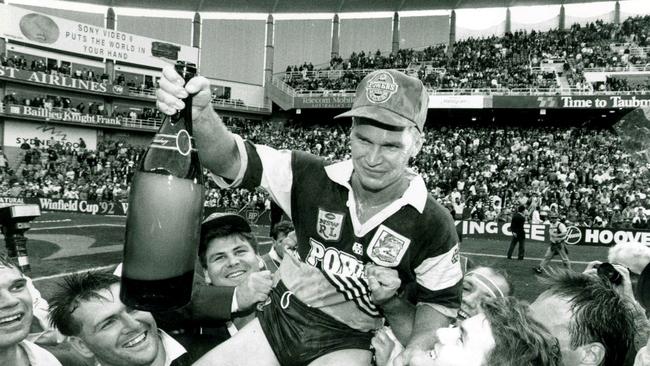
This gave Brisbane the luxury of moving on players when it suited the club, even if it didn’t suit the player. The Broncos moved on from Wally Lewis, the Australian Test captain and a Queensland deity, and were better for it. How many other clubs could dump an Immortal?
Therein lay the Broncos’ greatest strength - nobody was irreplaceable. Lewis, Gorden Tallis, Allan Langer, Steve Renouf, the Walters brothers … it didn’t matter. There was always somebody else, there were always new stars to dig out.
They rebuilt after the 1992 and 1993 premierships and the eventual result was the 1997 (Super League), 1998 and 2000 premierships. Then they rebuilt again and the result was the 2006 premiership. Then they rebuilt again.
It was a golden Sunday afternoon at Suncorp Stadium in 2010 when they played the ailing Cronulla Sharks. There aren’t many afternoon games at Suncorp, because they are the Broncos and the Broncos play on Friday nights, but the Queensland sun brings the ground to life in a way the night never can.

Brisbane destroyed Cronulla 44-16, and it was never that close. The Broncos lead 32-0 at half-time and didn’t even look like they were trying. Everything they did was laughably easy, and they looked like they would always play that way.
Matt Gillett scored first. He was playing out in the centres. He played everywhere that season, his debut year. The eventual Dally M rookie of the year, Gillett was a menace, large and ungainly but with a dancer’s feet and a winger’s speed, and the skill to play in the halves if he had to. It wasn’t known at the time if he would be a centre or a backrower, because he was so good at both it felt like a shame to stick him in one spot forever. It was as easy for him to put somebody into a hole as it was for him to run through it, and that’s a rare gift.
Jharal Yow Yeh didn’t score, but he did make a couple of breaks, and that’s enough to remind us how special he was. Yow Yeh was one of those players who just seemed to move across the field quicker than everybody else. It wasn’t just that he was fast, a lot of guys are fast — Yow Yeh covered the ground like everyone else was on half speed. He moved faster, he threw himself around with less regard for his own safety and it made him exhilarating to watch, right from the start.
Israel Folau got over twice, as he was wont to do. So many things have happened to Folau since, and he has worn so many different jerseys, but back then he was just Israel Folau, breaker of tackles, catcher of bombs, scorer of tries. Folau only played 90 NRL games, but he managed 71 tries. At 21 years old, he was the most dangerous weapon in rugby league. If he got close to the line, or if he got one-on-one with his opposite defender, it was over. There was nothing anybody could do about it. Nothing at all. There were no limits to what Folau could achieve in the game - even beating Ken Irvine’s tryscoring record wasn’t out of the question.
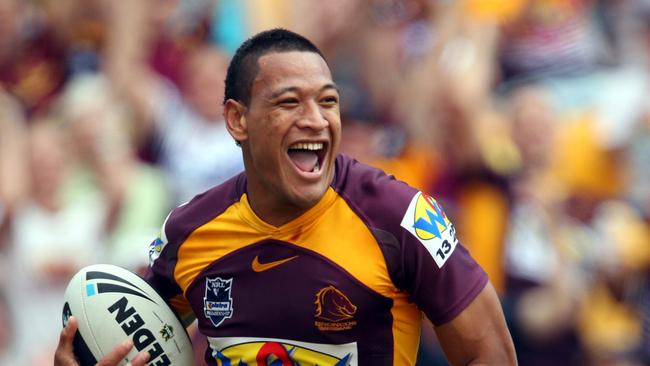
Ben Te’o managed a try of his own, out on that same edge as Folau and Yow Yeh. If a modern edge backrower was constructed in a lab, the result would be Ben Te’o. A superb athlete, swift and powerful and light on his feet, Te’o could crash through any defender they put in front of him. But he wasn’t just brawn, he was smart as well, capable of understanding the game and combining with the players around him. There was a future when Ben Te’o was the best forward in the world, and when he played in those days it did not feel far away.
Alex Glenn played hooker, and did a damn fine job of it. Glenn, like Gillett, could play anywhere back then. Centre, wing, hooker, backrow, even five-eighth now and then, he could do all of it. And he had to, otherwise he wouldn’t play - Brisbane had to find spots in the forward pack for Glenn, Gillett, Te’o, Sam Thaiday and Corey Parker.
Peter Wallace set up two tries, as did Darren Lockyer. There is a lazy school of thought out there that Brisbane have been trying to find another Allan Langer ever since the original retired in 2002. This is stupid for two reasons - one, as we all know, is that there will only ever be one Allan Langer and he can be replaced but not emulated. Two - Brisbane have replaced Allan Langer, several times.
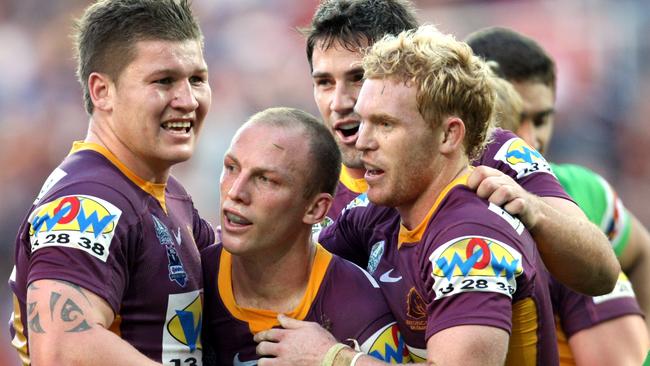
The replacement for Allan Langer doesn’t need to be like Allan Langer, he just has to be what the team needs at the time. Raw talent is not enough - if it was, Brett Seymour would have been Brisbane’s halfback for a decade, and Shane Perry would not have won a premiership.
Peter Wallace was not a top-tier halfback, but he didn’t need to be. He was smart enough to understand his role was to play his part, because Darren Lockyer was with him and, for Brisbane, through Darren Lockyer all things were possible.
A highlight of the match is the width Wallace provided the Broncos attack - they could move from one side of the field to the other in three passes, and when there’s firepower like Folau and Te’o and Yow Yeh and Gillett out wide, a long, early pass like that is all they needed to get one-on-one, and once they do that it’s pretty much over. Wallace was not the perfect halfback, but for a couple of years he was the perfect player to pair with Lockyer, and that was more important.
There’s no point pretending the Sharks were any great shakes in 2010, and taking them down wasn’t much of an achievement at the time. But it didn’t matter who Brisbane were playing, because when things came together and they ripped the opposition apart like they did on that sunny Sunday it felt like they played without boundaries, without limits. When they bared their teeth, run and hide.
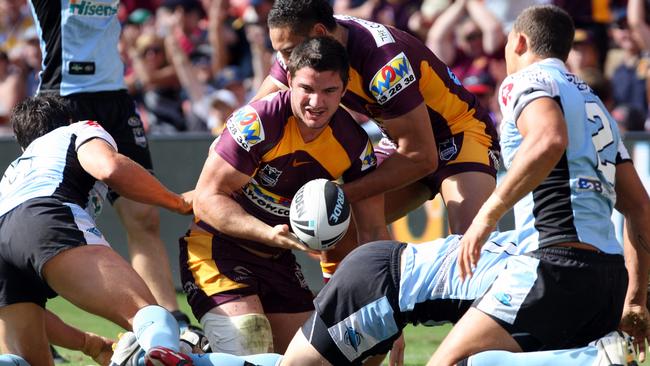
Of the 17 players who played for Brisbane that day, 13 of them played in a grand final at one point or another of their careers, and 12 of them played either Origin or Test football. These were the finest young footballers in all the world, and they were born and bred for one purpose — to pillage and plunder for the Broncos empire, to head to enemy lands and bring the prizes back to the Sunshine State, to head down to Sydney and take the trophy because it belonged to them, to do the things the Broncos had always done and, presumably, would always do.
That was what was supposed to happen, as it had for every Broncos generation of the past.
But the win was a mirage. This was part of a horror run when the Broncos managed one victory in seven weeks. They fell as low as 14th before rallying late, and they were sitting seventh with a month to go, all set for a rollicking run into the finals. If Wayne Bennett was still there that’s likely what would have happened, but Ivan Henjack was in charge now, and it wasn’t the same. Then Lockyer hurt his knee, missed the final month of the competition, and the Broncos lost four straight games.
The last of those four had Brisbane hosting Canberra at Suncorp, on a Friday night, of course. It was winner takes all and loser leaves town, and the Raiders won. For the first time since 1991, and just the third time in their history, Brisbane - to their shame - missed the finals. Henjack was sacked in the off-season. There are no second chances in Brisbane. The empire doesn’t tolerate them.
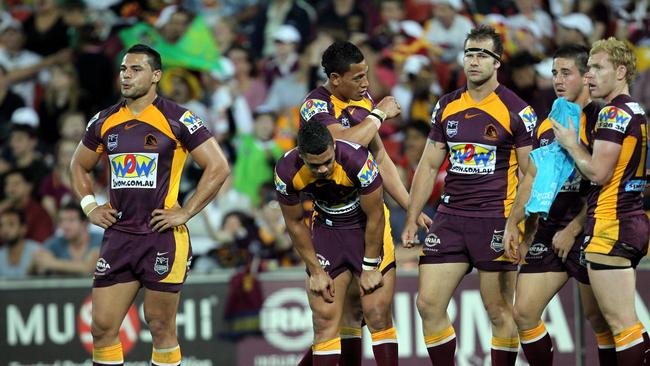
There is little reason to try and identify why this particular golden generation of Broncos could not emulate the success of the past. Bennett leaving is the single greatest factor, but even that doesn’t fully cover it.
For nearly all of these Broncos, their football failings were not of their own making. Sometimes things just don’t happen the way we want them to, and there’s nothing that can be done about it. The Broncos had all the pieces where they were supposed to be, and it didn’t matter. Sometimes it just doesn’t happen. Footballers are always talking about controlling the things they can control, because they cannot control everything.
Folau left first. He’d signed a rich deal with the GWS Giants midway through the season and failed in the new game, as many predicted he would. Then he went to rugby and became a global star, only returning to league this year when he had nowhere else to go.
Lockyer wasn’t long for the rugby league world either, retiring at the end of 2011. In his last ever game, he kicked a golden point field goal to beat Wayne Bennett’s Dragons in a sudden death semi-final at Suncorp Stadium, while nursing a fractured cheekbone. It ruled him out of the prelim against Manly, and all but ended what was shaping as a red-hot chance at the premiership. If a player like Lockyer cannot go out with a premiership, the next best thing is to ascend to the heavens on the shoulders of the faithful, never to be seen again and spoken of in reverent tones forever.
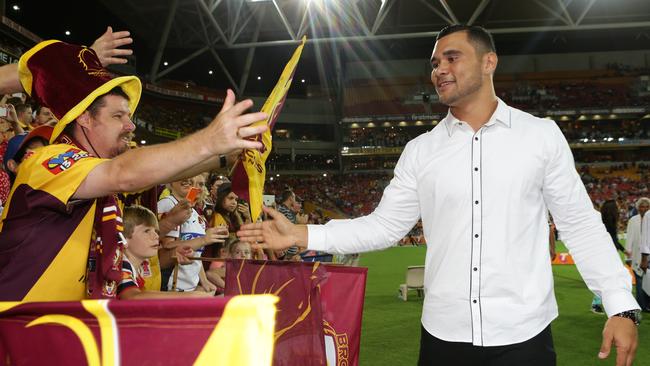
Yow Yeh went next, early in 2012. He’d become a Test and Origin player the year before, moving from prospect to star effortlessly. The entire rugby league world was in his hands, and he was good enough to carry it. But then, one day in Perth, against the Rabbitohs, Yow Yeh went up for a bomb and came down wrong, and his ankle snapped so bad the bone was poking through his sock, and Yow Yeh grabbed at it and teammates and foes alike screamed for the trainers to get on the field and they carried Yow Yeh off and he never played again. It was so cruel, for a rugby league life to be snuffed out like that. You wouldn’t wish it on your worst enemy. That was eight years ago. Jharal Yow Yeh is still just 30, and there are so many things he could have done.
Te’o was gone soon after, heading to South Sydney in 2013, and won a premiership the year after before heading to rugby.
The golden generation never came, and the end of those old ways doesn’t come all at once. It happens slowly, and you can’t even see it until it’s already over.
Brisbane finished eighth in 2012, then 12th in 2013 (their worst placing ever) and then eighth again in 2014. No longer were they the strength which in the old days moved heaven and earth. The Broncos will never be like everybody else, but that was when they came close.
Parker, Thaiday, Gillett and Glenn were still around in 2015, when Bennett came back and Brisbane made the grand final again. But they lost, and Bennett was run out of town again, and the Broncos’ premiership drought is now at 14 years and counting.
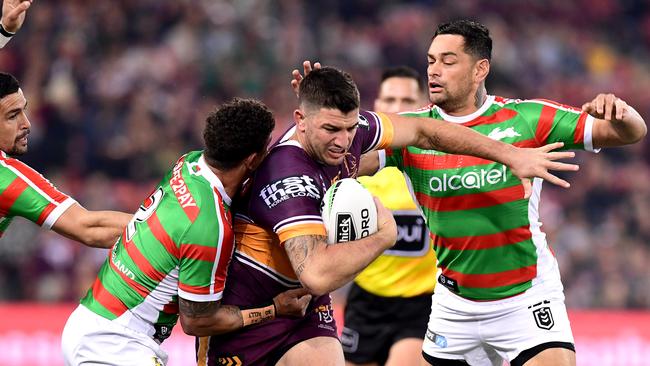
The end didn’t come for Gillett until 2019. By then he was a Test and Origin regular, widely counted as one of the better backrowers in the league. But he was better known for his defence than anything else, and he was a good defender, a strong and brave one without question. There’s lots of backrowers who are good defenders. There are not many who could do the things Gillett once could.
Gillett never had more line breaks, tackle busts, line break assists, tries or try assists than he did in 2010. He was never the same attacking weapon again. Gillett ended his career with 12 Tests, 20 Origin caps and won second rower of the year twice. He ended up being a lot, but even then he could have been more.
Glenn is still hanging around, he’s the last of that 2010 lot. He’s the captain now, a great honour for a player who loves the club as much as he does. But there’s new phenoms now, like David Fifita and Payne Haas and Tevita Pangai Junior, and once again there might not be a place for him as a starter.
Each of Brisbane’s golden generation went on to have good careers, even Yow Yeh, cut short though it was. Te’o’s won a premiership at Souths, and his rugby union exploits are extremely impressive, as were Folau’s.
Outside the players mentioned above, there are plenty of success stories, even among the lesser lights. Antonio Winterstein, for example, became a stalwart in North Queensland and won a premiership. Dunamis Lui, who scored a try in that win over the Sharks and has just two more to his name since, is an unlikely leader at the Raiders. Gerard Beale won a premiership with the Sharks and Wallace had a fine renaissance when he returned to Penrith.
Good things happened to so many of these players. But not all of it happened at Brisbane. There was so much potential, but that’s not always enough, and now Brisbane’s premiership drought has run to 14 years — a blink of the eye to clubs like Souths and Cronulla, who endured waits of nearly half a century.
But they are not like the Broncos and the Broncos are not like them. These things are relative, and 14 years without a title is a lifetime to the Broncos.
Their new dynasty never came. It was supposed to happen, because it always happened to the Broncos, they found new guys to replace the old guys and they kept winning and everything stayed the same.
That’s the way it was always going to be, and that’s how it was supposed to be in 2010, when they had so much.
And it was like it used to be, until it wasn’t any more.

